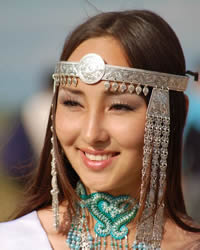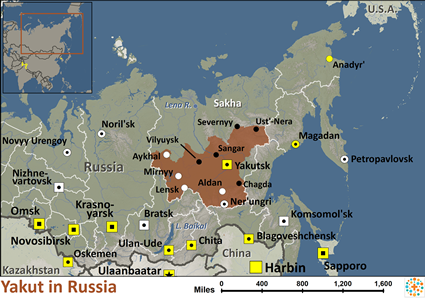Since ancient times, the Yakut have lived nomadic lives, caring for reindeer, tapping fur animals, hunting and gathering. They dwelled in tents.
Today the Yakuts are one of the largest groups of indigenous people living in Siberia, Russia. In fact, the vast region where they live is called Yakutia. A small group of Yakut wandered south and now reside in northern China. Russian Orthodox missionaries tried to convert the Yakut to Christianity in the 19th century, but their efforts were largely unsuccessful.
The government of the Soviet Union wanted the Yakut to settle down in one place and not continue to live as nomads. That began a process of getting the Yakuts to live in cement and brick houses.
Unfortunately, alcohol abuse is rampant among the Yakut. In fact, it is so prevalent that the number of murders, early deaths and suicides attributable to alcohol abuse may seriously jeopardize the future of this group.
They work in Russian mines, factories and in the lumber industry. Some Yakut still take care of reindeer looking for green plants for their herds. The reindeer provide food and furs for clothing and tents. They have cattle that are specially bred to survive the frozen landscapes of Yakutia. The Yakut trade extra milk, meat and furs for things they cannot make for themselves such as snow mobiles, cell phones and grain. Women search for berries and edible plants in the short Siberian summers. Winters in Siberia can bring temperatures of 60 degrees below zero.
The Yakut speak their own language among themselves and Russian at school and work. Some Yakut young people are moving out of the traditional Yakut region and going to live in Russian cities. They are searching for better educational and economic opportunities. These young people speak Russian as their first language and are being absorbed into the general Russian population. They often marry outside their people in the Russian cities. Some Yakut people have contributed to Russia as academics, musicians, writers, soldiers and athletes.
The Yakut are shamanists and practice folk religion. In the late 1800s anthropologist Waldemar Jochelson vividly described a Yakut religious ceremony: "A shaman has come to heal a sick woman, whose soul has been captured by evil spirits. He has put himself into a trance by inhaling tobacco, dancing, and beating his drum. Now his soul will travel to the spirit world and do battle in order to retrieve the woman's soul and thus restore her. His assistant holds the shaman by a chain so that if he gets lost or trapped in the spirit world he can be pulled back. Some of the flat iron pendants on the shaman's robe represent bird feathers, which allow the shaman's soul to fly. ... As the shaman dances, the noise made by these pieces and by the copper bells and rattles on the robe, as well as the sound of his drum and singing, help summon the spirits."
After decades of Soviet education, some Yakut are secular. They celebrate Yakut holidays for cultural not religious reasons. A small fraction of the Yakut claims to be Russian Orthodox Christians.
The Yakut need schools to educate their children. Many Yakut only have the bare rudiments of literacy. The nomadic lifestyle of some the Yakuts makes attending school difficult. Even where schools are available Yakut children often quit early to help their families make a living.
Most of all the Yakut need to hear and respond to the good news about Jesus. He alone can forgive their sins and give them a purpose for living. The New Testament in the Yakut language became available in 2017. Who will take these to Yakut communities?
Pry that the Yakut would be moved by the Spirit to read and heed their New Testament.
Ask the Lord to send loving workers to the Yakut.
Pray that the small number of Yakut believers would grow strong in the faith and share the gospel with their family and friends.
Ask the Lord to raise up a disciple-making movement among the Yakut.
Scripture Prayers for the Yakut in Russia.
https://www.msn.com/en-us/news/world/their-ancestral-traditions-under-threat-a-village-in-russia-s-far-east-stands-up-to-gold-mining-giant/ar-BB1nkLDC?ocid=BingNewsSerp
https://en.wikipedia.org/wiki/Yakuts
| Profile Source: Joshua Project |


























